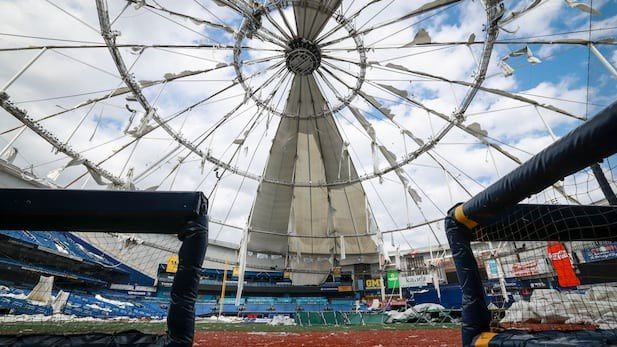|
n a surprising turn of events, the St. Petersburg City Council reversed its decision on Thursday regarding a $23 million fund allocation for repairing the hurricane-damaged roof of Tropicana Field, home of the Tampa Bay Rays. Initially, the council narrowly voted to approve the spending, but hours later, they rescinded the decision, leaving the future of the iconic ballpark uncertain.
The council's about-face followed their decision to delay consideration of revenue bonds for a proposed new $1.3 billion stadium for the Rays. Just two days earlier, the Pinellas County Commission had also postponed a vote on its share of the new stadium bonds, casting doubt on the entire project. "This is a sad place. I'm really disappointed," said council chair Deborah Figg-Sanders. "We won't get there if we keep finding ways we can't." The lack of progress is causing concern for the Rays, who believe it puts both the new stadium plan and the future of Tropicana Field at risk. "I can't say I'm confident about anything," Rays co-president Brian Auld expressed to the council members. Tropicana Field's translucent fiberglass roof was severely damaged on October 9 when Hurricane Milton struck just south of Tampa Bay. In addition to the roof damage, the stadium sustained significant water damage, with total repair costs estimated at $55.7 million. Extensive repairs are not expected to be completed before the 2026 season, according to city documents. In the meantime, the Rays have arranged to play the next season at Steinbrenner Field, the New York Yankees' spring training facility in Tampa, which seats 11,000 fans. MLB Commissioner Rob Manfred emphasized the need to give the Rays and local politicians time to find a path forward following the hurricane's disruption. Assuming the repairs go ahead, the Rays are committed to playing at Tropicana Field for three more seasons. "We're committed to the fans in Tampa Bay," Manfred said at an owners meeting. "Given all that's happened in that market, we're focused on our franchise in Tampa Bay right now." Initially, Thursday's vote was meant to start the roof repair. Once completed, crews could begin laying down a new baseball field, fixing damaged seating and office areas, and updating various electronic systems. However, the subsequent vote to reverse the funding means the city and the Rays must now find an alternative solution in the coming weeks to ensure Tropicana Field is ready by the 2026 season. The city is legally obligated to repair the roof. "I'd like to pare it down and see exactly what we're obligated to do," said council member John Muhammad. Previously, the city had voted to spend $6.5 million to prevent further damage to the uncovered Tropicana Field. Several council members emphasized that the city is contractually required to fix the roof. "I don't see a way out of it. We have a contract that's in place," said council member Gina Driscoll. "We're obligated to do it. We are going to fix the roof." The initial approval for the roof repair passed by a 4-3 vote. Those who opposed it cited unclear details regarding insurance coverage and potential Federal Emergency Management Agency (FEMA) contributions. They also pointed out that city residents struggling to repair their homes and businesses damaged by Hurricanes Helene and Milton are concerned about the allocation of such a large sum to a baseball stadium. "Why are we looking to expend so much money right away when there is so much uncertainty?" asked council member Richie Floyd. The new Rays ballpark—now projected to open in 2029, if at all—is part of a larger urban renovation project known as the Historic Gas Plant District. This initiative aims to transform an 86-acre tract in downtown St. Petersburg, which once housed a predominantly Black neighborhood displaced for the construction of Tropicana Field and an interstate highway spur. The $6.5 billion project includes plans for a Black history museum, affordable housing, a hotel, green spaces, entertainment venues, and office and retail space, promising thousands of jobs. Despite the setbacks, St. Petersburg Mayor Ken Welch remains optimistic. "We believe there is a path forward to success," he said. As the city navigates these challenges, the community will closely watch how the plans for Tropicana Field and the new stadium unfold, hoping for a resolution that benefits both the local residents and the future of baseball in St. Petersburg.
0 Comments
Leave a Reply. |
Categories
All
|
